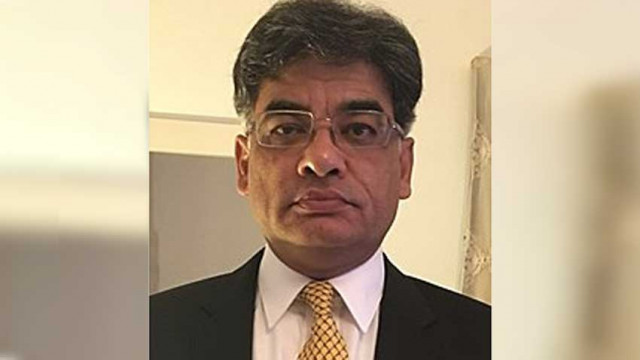AGP seeks SC’s robust interpretation of Constitution
Khalid Jawed Khan files written submission in presidential reference on Senate vote

Attorney General for Pakistan Khalid Jawed Khan has urged the Supreme Court to adopt a robust and dynamic interpretation while interpreting the Constitution in the presidential reference case, in order to achieves greater constitutional objectives.
In his written submissions in the presidential reference case, ahead of a hearing by a larger bench headed by Chief Justice Gulzar Ahmed on Wednesday (today), AGP Khan also elaborated on those objectives, which included transparency and accountability in the election process.
Last month, the government filed a presidential reference in the Supreme Court, seeking guidance about holding the upcoming Senate polls through open ballot rather than secret ballot. The AGP had filed the reference under the Article 186 of the Constitution, invoking the court’s advisory jurisdiction.
The reference seeks interpretation of the Article 226 of the Constitution which says all elections under the Constitution other than those of the prime minister and chief ministers shall be held through secret ballot. The bench takes up the reference for hearing on Wednesday (today).
In his written submission, the AGP requested the court to adopt a robust and dynamic interpretation of the Constitution, which fully reflected the will of the people and prohibited forever the malaise of vote buying and entry of undesirable candidates in parliament.
Elaborating on the “greater constitutional objectives”, the AGP listed promotion of transparency and accountability in the electoral process, acknowledging the respect for the choice of the voters, discouraging horse trading, blackmailing, use of laundered money for vote buying, empowering the legislature, adoption of means most suitable by providing machinery and procedure for ensuring free, fair and transparent elections, and to “demonstrate that the Constitution of Pakistan is a living, dynamic and organic document capable of redressing the ills of electoral process without repeated amendments to the fundamental document”.
The AGP said that the Senate election was party-based election and the political parties were crucial to the growth of parliamentary democracy, which had been held by apex court as a salient feature of the Constitution.
“MNAs [members of the National Assembly] and MPAs [members of provincial assembly] voting in indirect election for Senate act as trustees or proxies of their parties and exercise a derivative or secondary right,” he said.
“In past the malaise of vote buying and horse trading has polluted the democratic process which has been universally condemned. In an open or traceable ballot, the member can still vote as he likes but his choice will be traceable and known to his party,” he added.
“It would still not fall under Article 63A, resulting in declaration of his defection,” he said. He added that “it is also said that the machinery for the elections is not given by or under the Constitution and is left to be regulated by law ie the Elections Act, 2017”.
According to the AGP, if the Article 226 was construed to include all elections referred to in the Constitution, then a complication would arise. “Articles 51(6)(d)&(e) provide a special method whereby women and minorities ‘shall be elected’ in accordance with law through proportional representation system of political parties list. The law is provided in Section 104, Elections Act, 2017,” he pointed out.
“There is no voting/polling for these elections as these are based on party lists. Yet this being an ‘election’ under the Constitution, Article 226 will fully apply as Article 226 does not start with the words ‘subject to Constitution’. This will create an irreconcilable conflict between Articles 51(6)(d)&(e) and Article 226,” the AGP said in his written submission.
Also Read: The 18th Amendment and the Supreme Court
However, the AGP argued, these provisions could be perfectly reconciled if it was accepted that the Article 51 only provided for the composition and complexion of the National Assembly ie directly-elected representatives of the people on general seats, women seats and minorities seats, “through methods specified there leaving the elections to be conducted ‘in accordance with law’ as specifically provided in Articles 51(6)(a), (d) and (e) ie Chapter V and VI of the Constitution”.
The AGP said that voting for the National Assembly was required to be held through the secret ballot as provided in the Section 81 of the Elections Act, 2017 and not because it was an election under the Constitution in terms of Article 226, but on account of Article 51(6) read with Article 19 of the Constitution. This also remains the position in India, he added.
“If the framers of the Constitution wanted election for the Senate to be by secret ballot as is the case for presidential elections in clause 12, 2nd Schedule, they could have simply added the word secret in Article 59(2) which specifies the system of proportional representation by means of a single transferable for elections for Senate.
“In that case though the election to Senate would still be election under the Election Act, 2017, but owing to the words ‘subject to Constitution’ in Article 222, Parliament would be constitutionally required to provide for elections for Senate by secret ballot.”
The AGP concluded, saying that it was evident that the ambit of jurisdiction under Article 186 was vast and any question of law of public importance could be referred by the president for the opinion of the Supreme Court.
Unlike cases falling under the Article 184(3) in the original jurisdiction of this court, the question of maintainability or jurisdiction did not strictly arise under the Article 186, he added.


1724319076-0/Untitled-design-(5)1724319076-0-208x130.webp)
















COMMENTS
Comments are moderated and generally will be posted if they are on-topic and not abusive.
For more information, please see our Comments FAQ